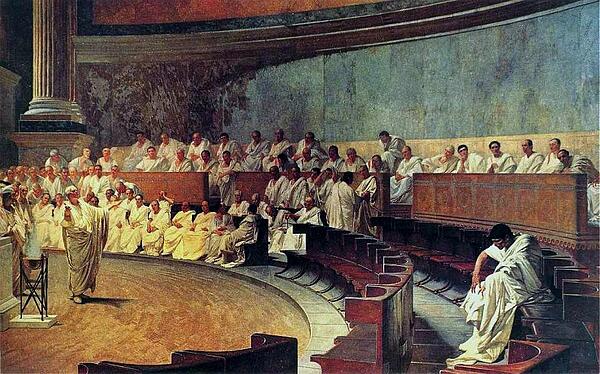The Governing of Ancient Rome
Rome’s early days were governed by kings. However, Ancient Rome soon developed its own government which enabled them to govern themselves.
Rome was in fact a democratic country towards its own citizens and would gather together at an assembly to elect their own officials. Chief officials were known as consuls and there were two of them who governed for a year when Rome was still a Republic. Though if the consuls did not perform according to expectation they could be voted out of the next election. Consuls were not expected to know everything and were advised by a Senate, made up of leading citizens of Rome. When the Senate met they would discuss issues such as proposed new laws and financial issues affecting the city. Altogether they were made up of approximately 600 men from rich and noble families.
Though the elections were democratic, the Senate’s role in comparison was definitely not - decisions were made in favour of the rich as they were the only ones in a position to use their wealth for influencing decisions within the Senate. The lower classes generally did not question this system as they felt the rich were entitled to assist with the Senate’s work and those of a lower status had no say.

The Senate also existed during Rome’s rise to power, which contributed to its favour.
Additionally, there were also other elected officials such as judges, magistrates and tax collectors among others. The poor of Rome were looked after by ten ‘Tribunes of the People.’
As the Roman Empire continued to grow and become a powerful city, top government positions became more and more appealing. So for this reason a flow of ambitious men became involved in government, all who believed Rome would be better served by one man governing the city and empire, rather than a group of elected officials. This led to the ruling of emperors.
In 48 BC Julius Caesar took control of Rome and its empire which ended the traditional government system used for many years. Caesar was then murdered by Brutus who wanted to keep the old system running. However even after Caesar’s death his supporters began a civil war to promote their views onto Rome. Out of exhaustion many citizens began supporting Caesar’s nephew Augustus, who was known as a strong ruler. He became emperor in 27 BC and finalised the end of Rome as a republic.
See also: The Roman Empire
MLA Citation/Reference
"The Governing of Ancient Rome". HistoryLearning.com. 2025. Web.
